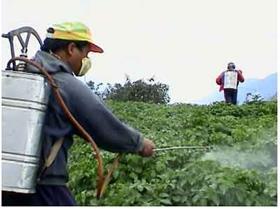
The Indian government’s refusal to support a ban on the pesticide endosulfan has been criticised by the country’s forest minister Benoy Viswom.
Mr Viswom’s criticism came after the sixth meeting of the Persistent Organic Pollutants Review Committee to the Stockholm Convention in Geneva last week, reported The Hindu.
A proposal to ban endosulfan was voted on at the Committee meeting by the 29 member countries. India abstained from the vote along with three other countries, although the Committee voted to recommend a ban on the manufacture, use, import and export of endosulfan.
“India’s stand was not right,” Mr Viswom told The Hindu. “The general consensus at the meeting was in favour of the ban. India should have supported that view.”
He said the Indian government should not have become the spokesman for the pesticides lobby at the meeting.
India is the largest global user of endosulfan, and a number of Indian chemical companies manufacture the pesticide.
Used to control a number of pests on crops in India such as cotton, cocoa, cashews, potatoes, cabbages, coffee and soybeans, endosulfan has been identified as an endochrine disruptor – a class of chemicals which upsets normal production of hormones in animals.
“It is high time that the Centre accepts the truth `about endosulfan` and stands for the welfare and future prosperity of the country,” stated Mr Viswom.
“If you go to Kasaragod, you can see the effect of endosulfan on the people. Many of the affected were in such a condition that they could be described as the living dead.”
Kasaragod, in the state of Kerala, has been the focus of calls to ban endosulfan in India.
Kerala’s High Court banned endosulfan use in the state in 2002 following a rash of chronic illnesses and hundreds of deaths that were attributed to use of the chemical in cashew plantations.
Australia is the latest of more than 60 countries to ban the chemical, announcing last week it would suspend licences for pesticides containing endosulfan, calling it a “persistent pollutant”.



